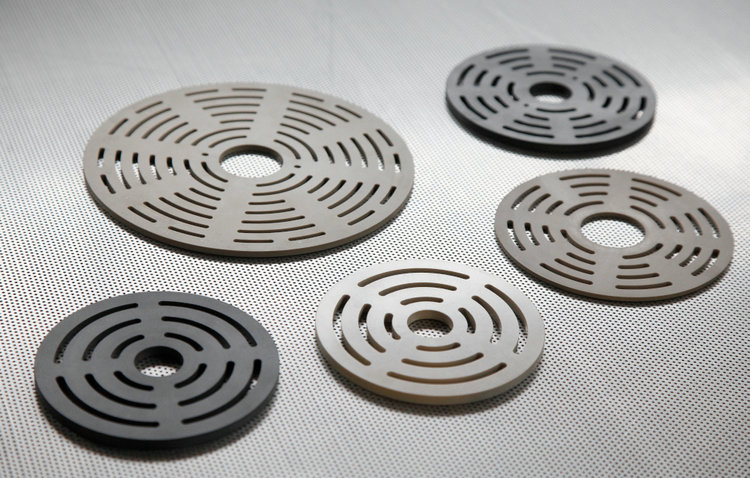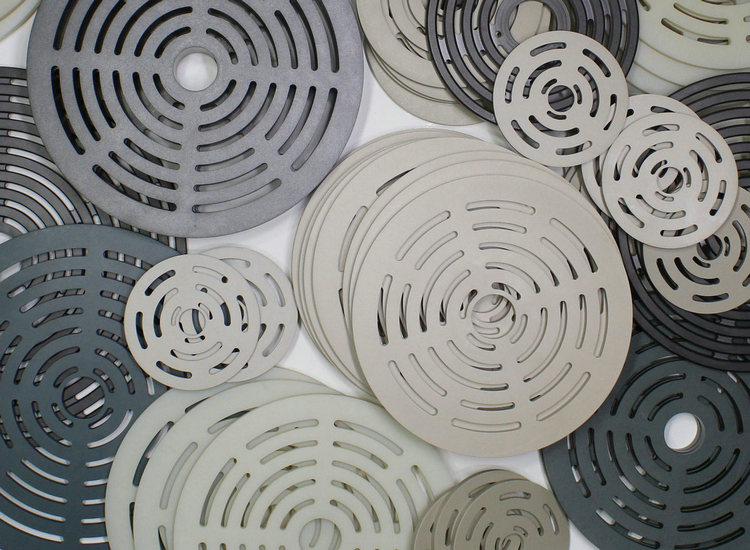
Polyether Ether Ketone (PEEK) is a high-performance thermoplastic that has gained significant traction in the valve industry, particularly for compressor valves. Known for its exceptional mechanical properties, thermal stability, and chemical resistance, PEEK is an ideal material for valve plates that must perform reliably under demanding conditions. This article explores the advantages of PEEK valve plates and compares three primary types: virgin PEEK, carbon-filled PEEK, and glass-filled PEEK.
Overview of PEEK Valve Plates
PEEK valve plates are critical components in compressor valves used across various industries, including oil and gas, chemical processing, and refrigeration. These plates must withstand extreme conditions such as high pressures, temperatures, and corrosive environments. The choice of material for valve plates significantly impacts performance, reliability, and longevity in compressor systems.
Types of PEEK Valve Plates
1. Virgin PEEK
Description: Virgin PEEK is the unmodified form of the polymer, known for its purity and excellent inherent properties.
Advantages:
High Mechanical Strength: Virgin PEEK offers substantial tensile strength and toughness, making it suitable for applications requiring durability in compressor valves.
Excellent Chemical Resistance: It can withstand exposure to a wide range of chemicals without degrading, which is crucial in corrosive environments typical in compressor applications.
Thermal Stability: Virgin PEEK maintains its properties at elevated temperatures up to 260°C (500°F), ensuring reliable performance in high-temperature conditions.
Applications: Commonly used in valve seats and seals within compressor valves where purity and performance are essential. Its high resistance to wear makes it suitable for applications involving frequent movement or contact with other materials.
2. Carbon-Filled PEEK
Description: This variant incorporates carbon fibers into the PEEK matrix to enhance its properties.
Advantages:
Enhanced Strength and Stiffness: Carbon-filled PEEK exhibits superior mechanical strength compared to virgin PEEK, making it ideal for high-load applications in compressors.
Improved Wear Resistance: The addition of carbon fibers significantly enhances wear resistance, reducing maintenance needs and extending service life in demanding environments.
Thermal Conductivity: This variant offers better thermal conductivity than virgin PEEK, aiding in heat dissipation during operation.
Applications: Widely used in high-performance compressor valves where durability under load is critical. Its properties make it suitable for valves that operate under high pressures and fluctuating temperatures.
3. Glass-Filled PEEK
Description: Glass-filled PEEK contains glass fibers that improve its rigidity and dimensional stability.
Advantages:
Superior Stiffness and Dimensional Stability: Glass-filled PEEK provides excellent structural integrity under load, making it ideal for components that must maintain precise dimensions over time in compressor applications.
Good Chemical Resistance: Like other forms of PEEK, glass-filled variants resist a wide range of chemicals, ensuring longevity even in harsh environments typical of compressor operations.
Lower Thermal Expansion: This material exhibits reduced thermal expansion compared to virgin PEEK, which helps maintain dimensional accuracy during temperature fluctuations common in compressors.
Applications: Frequently utilized in valve seats and other structural components of compressor valves where stiffness is required. Its dimensional stability makes it particularly valuable in applications where precise alignment is critical.

Comparative Analysis
| Property | Virgin PEEK | Carbon-Filled PEEK | Glass-Filled PEEK |
| Tensile Strength | Moderate | High | High |
| Stiffness | Moderate | Very High | Very High |
| Wear Resistance | Moderate | Excellent | Good |
| Thermal Stability | Up to 260°C | Up to 260°C | Up to 260°C |
| Chemical Resistance | Excellent | Excellent | Excellent |
| Impact Resistance | High | Moderate | Lower |
| Cost | Moderate | Higher | Higher |
Conclusion
Selecting the appropriate type of PEEK for valve plates is crucial for optimizing performance in compressor applications. Virgin PEEK is well-suited for applications requiring high purity and mechanical integrity. In contrast, carbon-filled PEEK provides enhanced strength and wear resistance for demanding high-load scenarios typical of compressors. Glass-filled PEEK offers superior stiffness and dimensional stability, making it ideal for structural components under stress.
As industries continue to evolve towards more demanding operational conditions, the advantages offered by these specialized forms of PEEK will play a pivotal role in enhancing the reliability and efficiency of compressor valve systems. The ongoing development of advanced PEEK materials promises further innovations in valve technology, ensuring they meet the rigorous standards required in today’s industrial landscape. This version emphasizes the application of PEEK materials specifically within the context of compressor valves while retaining all relevant information about their properties and advantages.